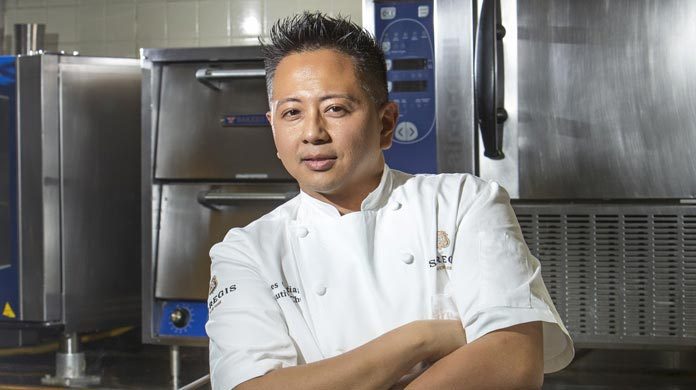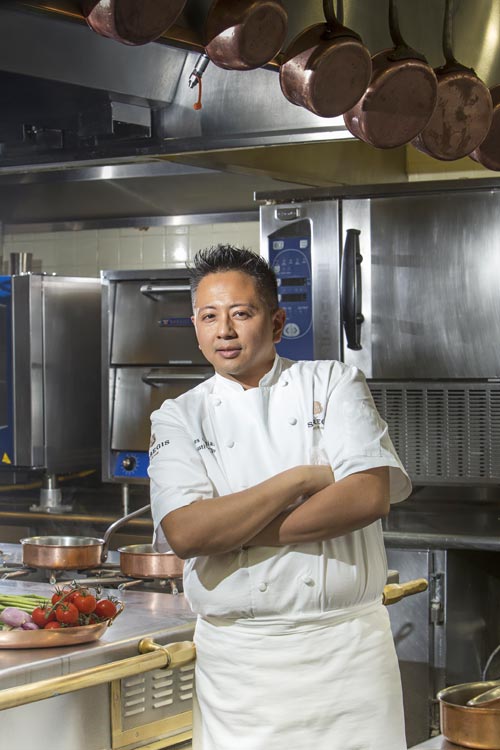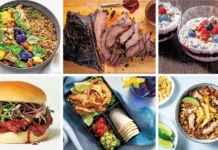
James Ortiaga, much like others when first entering the culinary world, did not have a clear path to his current position as Executive Chef at the St. Regis.
He was born in the Philippines and immigrated to the United States at the mere age of 6, spending his childhood in New York Staten Island suburbia. It was there that James Ortiaga first became acquainted with the culinary world; the New York melting pot of cuisines landed in his backyard. Days spent at his mother’s side in the kitchen fed the flames of his passion for food and for cooking, but a successful career that now seems inevitable was close to never occurring.
After a brief stint studying medicine, Ortiaga followed his dreams to the New York Restaurant School. From there, he spent six years working with Wayne Nash at March restaurant and climbed his way to the role of Chef de Cuisine. Slowly, Ortiaga found himself entering the hotel industry; he held Sous Chef positions at the Pierre Hotel and at L’Atelier de Joel Robuchon at the Four Seasons before joining the team at Mauna Lani Bay Hotel in Waikoloa, Hawaii. From there, Ortiaga accepted a role as Executive Sous Chef at the St. Regis in 2011 and is now the team’s Executive Chef as of 2015. Ortiaga stands by the principles of pushing boundaries and buttons; he is not afraid to take risks, culinary or otherwise. He refuses to “be a statistic.” We recently had the pleasure of interviewing the Executive Chef to learn more about his approach to food and life in general.
What was your inspiration for joining the culinary world?
Well first off, I should mention it wasn’t my first-choice career. But my heart and passion were always with food. I was born in the Philippines, but at six years old I was able to make it here to the mainland. I grew up in New York Staten Island suburbia, so that’s how I really got “taken.” I grew up with the New York melting pot, and I was next to Mom quite often in the kitchen and took a liking to it.
Where did you study? Any difficulties in training to be a chef?
Most of my family was in medicine, so that’s where my studies took off. After the second year, I kind of put the brakes on it; I just told Mom and Dad it wasn’t working. They were disappointed at first, because as parents we want what’s best for our kids. But I need to be happy with what I’m going to do for the rest of my life, and it was a decision I thought I could make at that age.
I took it upon myself to stop what I was doing and visit a school, which at the time was one of the smaller schools and really not a big deal. This was the New York Restaurant School. They gave me a tour, but then I hit a brick wall because I needed parental consent to enroll; I had no choice but to let them know at that point. I ended up graduating at the top of my class. Beyond putting in a lot of emphasis and energy into the actual work, I was really in the mindset that I wanted to be there. I really appreciated this education simply because it gave me an understanding of the classical and fundamental respects of the culinary arts. It gives you that foundation.
How did you end up on the hotel side of the food industry?
 After working with Wayne Nash at March restaurant for a solid six years, I stumbled across this opportunity to work at the Essex House. I offered free work and free help. I was just an intern. I was able to stand out though, and was offered an opportunity in a new venture: the Mix NY Groupe. From there I made my way into the hotel side of the industry.
After working with Wayne Nash at March restaurant for a solid six years, I stumbled across this opportunity to work at the Essex House. I offered free work and free help. I was just an intern. I was able to stand out though, and was offered an opportunity in a new venture: the Mix NY Groupe. From there I made my way into the hotel side of the industry.
How did you find success in this world of service?
I entered the opportunity at the Mix NY Groupe blind. Everyone else was more of a veteran and I was taking a position of a supervisory role. But it’s all in the approach – the first impression. I tried to treat everyone with respect, no matter the situation; that was my number one rule. When you win people’s hearts, their minds follow. I know this because of my culture; everyone gets respect. It just followed; even though some of them were there for years, they gained confidence in me and were able to look past the fact that I was young.
Explain how you prepare the food and ingredients. Any differences when compared to a traditional restaurant?
There’s just nothing different at all as far as bringing in the right, high quality cuts of meat. In this particular environment, I have my own virtual butchers. The whole animal may not pass through the kitchen, but we get filets. I’m still tasked with breaking down the trimmings and so forth.
How do you build a team in this specific environment?
It all starts from the top. A strong leadership, starting from me, is necessary; then my chef de cuisine and sous chefs all need to have the same mindset of the executive chef. To create this strong team mentality, cooperation and camaraderie is necessary. This connects back to what I said earlier about treating everyone with respect; we’re all human beings. If you treat others with respect, you can expect the same in return.
What about the skills necessary to be a great executive hotel chef?
You should always focus on those who want to learn more. What keeps people here and motivated for so many years is that they’re engaged; that’s the only way a good chef can hold down a good team, by keeping them engaged. You’ve got to continuously change, sharing new methods and trending techniques. You’ve got to keep the trash out to keep it fresh; otherwise, you’ll have complacent food. Good food is derived from having good energy in the kitchen. If there’s someone who’s angry or miserable, it’ll show in the food; so cultivate a good energy.
Any necessary personal values? How have you managed to become so successful in such a competitive field?
I’m the type of chef that will always be the one to push buttons, even knowing that there are certain folks out there who won’t like my food at an establishment like this. I hear and acknowledge them, but I won’t stop; I’ll continue to push my chefs to put out nice menus and good food. I won’t keep it mediocre; I don’t want to be a statistic. I want to make sure that the doors keep revolving with customers coming in and out. There’s only one way to do that; push buttons.
What advice would you give to other young, aspiring chefs?
If you really want to be somewhere and show high interest, you’re going to excel. There’s no doubt. Going to school is also very important; it’s one of those things where it looks good on resumes that you graduated with a certificate or degree from a certain school, but it also gives you that foundation. Anytime you want to build up, you have to have strong foundations to rely on.
To learn more about James Ortiaga and his fine cuisine at the St. Regis New York, visit their website.























